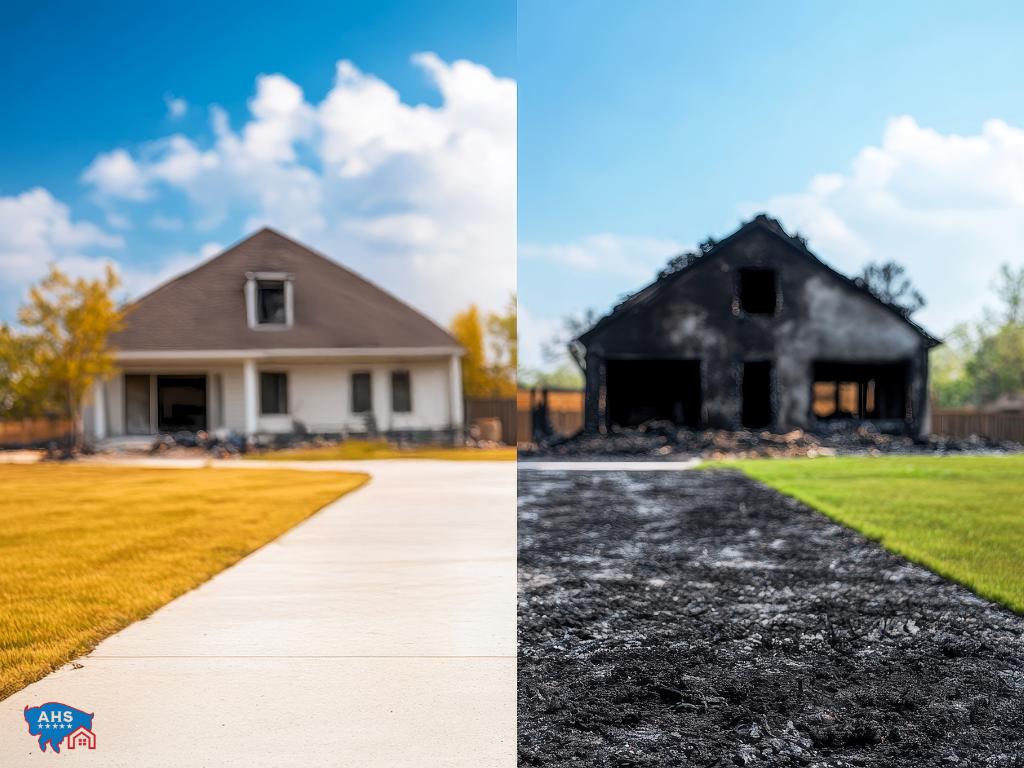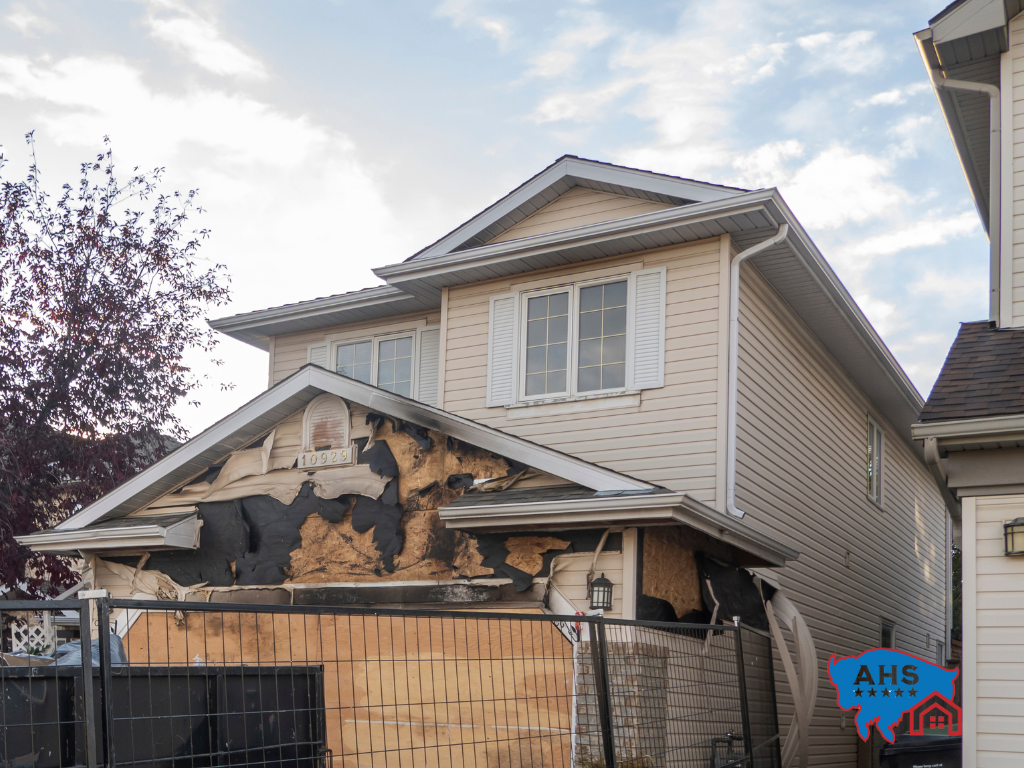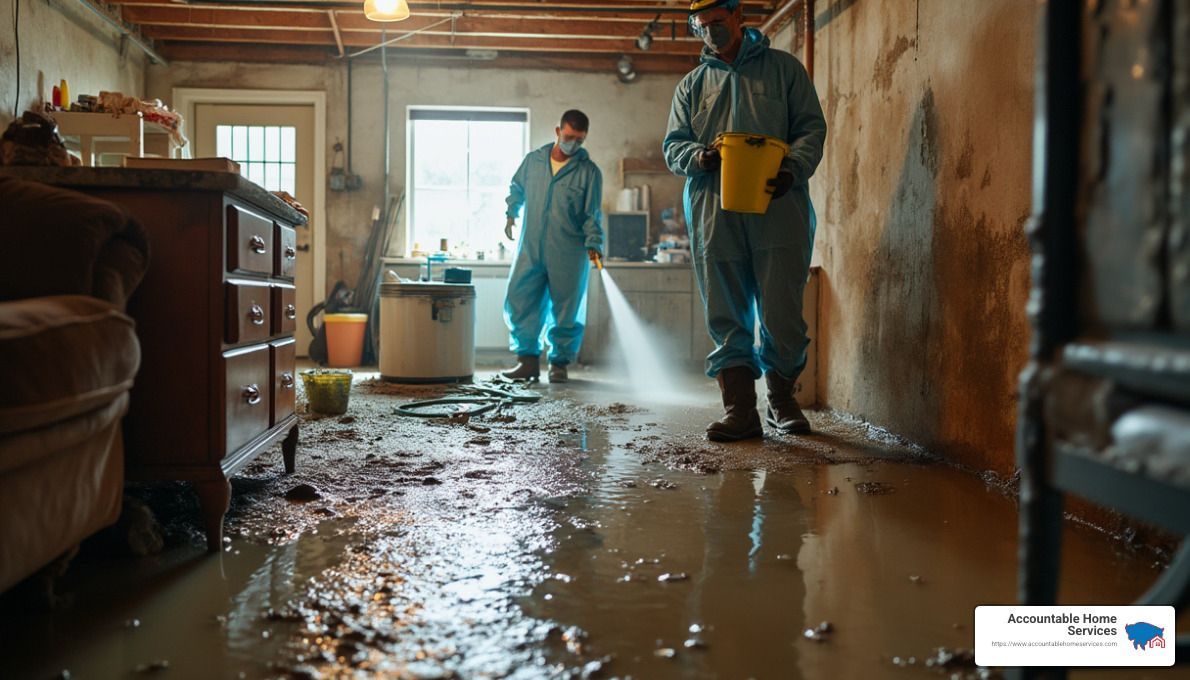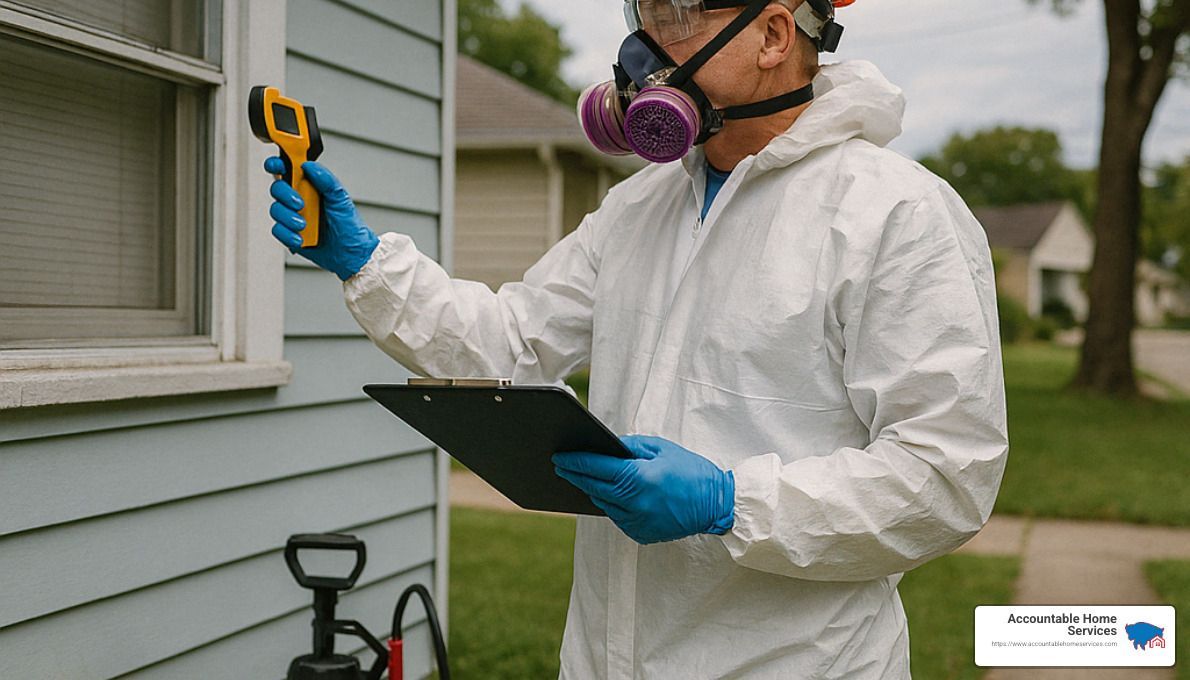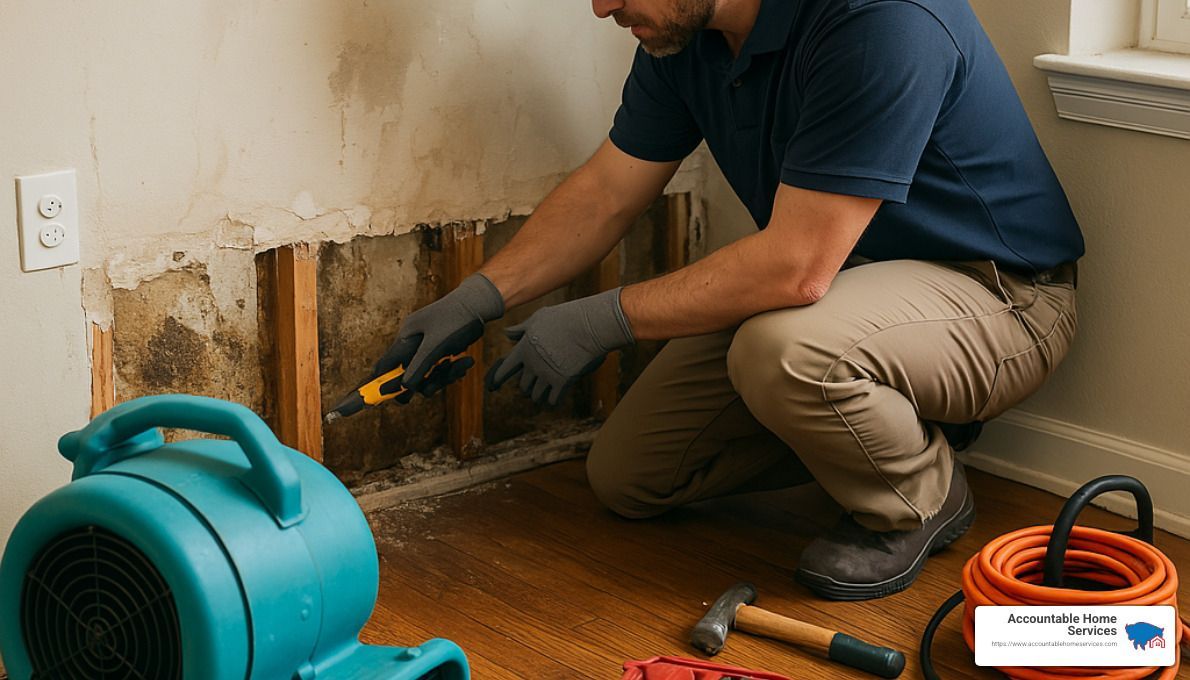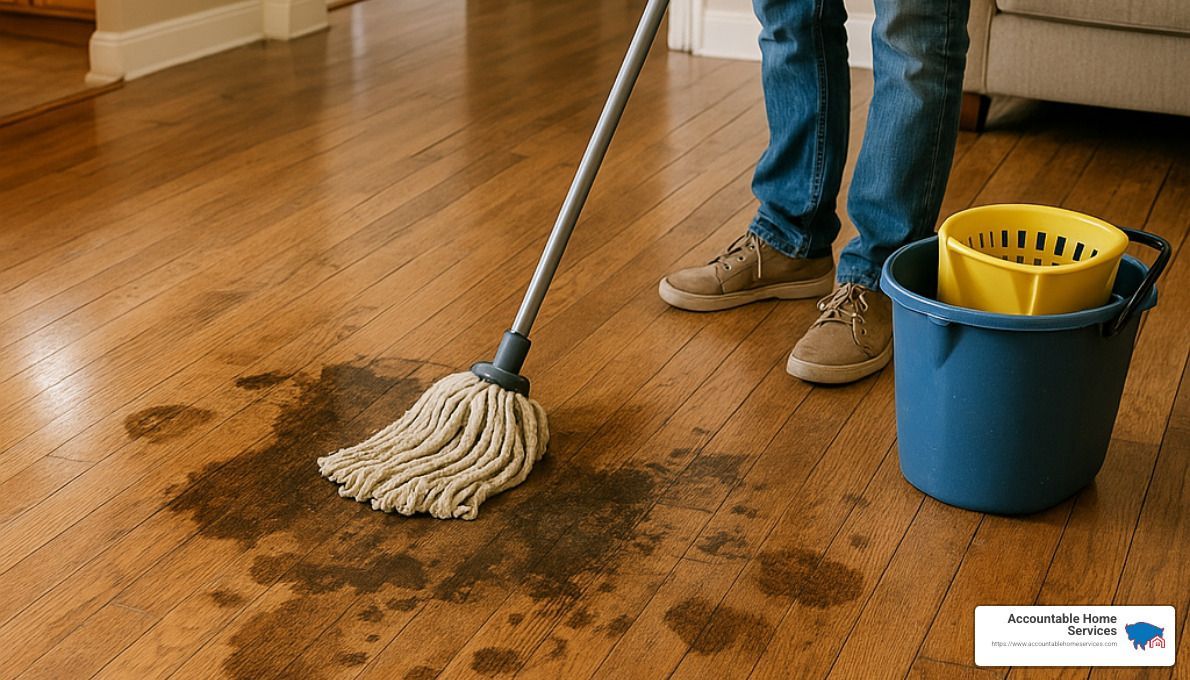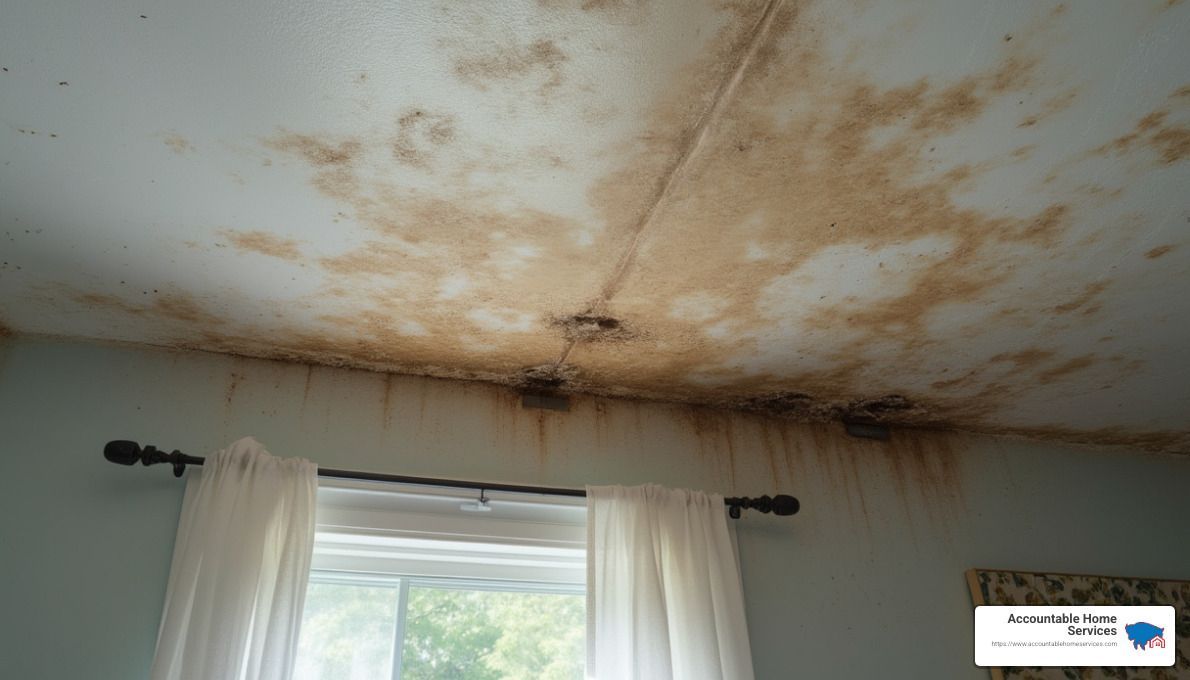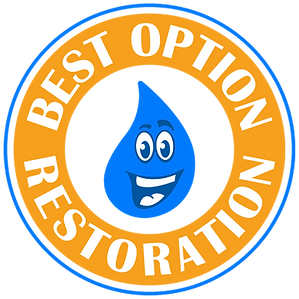Blog
The Growing Threat of Mold in Denver County: Why Fast Action Matters
If you're looking for mold remediation Denver County services, here's what you need to know:
- Response Time: Professional mold remediation services can respond within 24-48 hours
- Average Cost: $1,500-$4,000 depending on severity and scope
- Process Duration: Typically 3-7 days for complete remediation
- Best Practice: Choose certified mold remediation specialists with IICRC certification
- Health Protection: Professional remediation significantly reduces health risks from mold exposure
Mold remediation Denver County services are essential for protecting both your property and your family's health. In Denver's unique climate, mold can begin growing in as little as 72-96 hours after water exposure, quickly spreading throughout your home or business. What might appear as a small spot on your wall could indicate a much larger problem lurking behind surfaces, within HVAC systems, or under flooring.
With Denver County's varying elevation and seasonal moisture changes, properties here face distinct challenges when it comes to mold growth. Professional remediation isn't just about removing visible mold—it's about identifying the source of moisture, properly containing the affected areas, and ensuring that spores don't spread to unaffected parts of your property.
I'm Mike Martinez, owner of Accountable Home Services, and my team has handled thousands of mold remediation Denver County cases, giving us unique insight into the specific challenges local homeowners face with mold issues. As a family-operated restoration company serving Denver County, we understand how quickly mold can turn from a minor concern into a major health and property threat.
Understanding Mold Growth in Denver County
Living in Denver County comes with many perks—stunning mountain views, four distinct seasons, and a vibrant community. But our unique climate also creates the perfect storm for mold growth in homes and businesses throughout the region. As longtime residents and mold remediation specialists, we've seen how our local environmental factors create distinct challenges for property owners.
The Denver County Mold Challenge
If you've lived in Colorado for any length of time, you know our weather can change on a dime. These rapid shifts aren't just conversation starters—they're creating ideal conditions for mold in your home. Did you know that over 60% of basements experience moisture seepage, and a whopping 38% develop mold and fungus growth due to liftd moisture levels? In Denver County, these numbers can be even more concerning.
Our region faces several unique environmental factors that make mold remediation Denver County services particularly important:
Rapid Weather Changes create condensation issues inside homes when warm, moist air collides with cooler surfaces—something that happens frequently with our famous temperature swings. One day it's 70 degrees, the next we're shoveling snow, and your home's surfaces are caught in the middle.
Snowmelt Cycles during our winter-to-spring transitions often lead to water seeping into foundations. That beautiful snow might look harmless, but as it melts, it can find its way into your home's vulnerable areas.
Summer Thunderstorms roll in with intensity, sometimes dumping inches of rain in short periods. These downpours can overwhelm drainage systems, especially in older Denver homes or properties with landscape grading issues.
Varying Elevations throughout Denver County mean different neighborhoods experience vastly different humidity levels. What works for moisture control in Highlands Ranch might not be sufficient in lower-lying areas.
Indoor Humidity Fluctuations plague many Denver homes as residents try to balance our naturally dry climate with comfortable indoor air. Many homeowners overcompensate with humidifiers, inadvertently creating perfect conditions for mold growth.
"Mold can spread throughout a property in as little as 48 hours under the right conditions," explains our lead remediation specialist. "In Denver's climate, we often see homeowners caught off guard by how quickly a small moisture issue can develop into a significant mold problem."
Common Sources of Mold in Denver County Homes
After responding to thousands of mold remediation Denver County calls over the years, we've identified several recurring culprits behind mold growth in local homes:
Flooding events can occur from natural causes or plumbing failures. Whether it's a broken washing machine hose or a backed-up storm drain, standing water quickly becomes a mold breeding ground if not addressed within 24-48 hours.
Roof leaks become particularly problematic after our heavy spring rains or when winter ice dams form. That small water stain on your ceiling might indicate a much larger problem developing in your attic space.
Burst pipes during our bone-chilling cold snaps are a major source of hidden moisture. When temperatures plummet below freezing, exposed pipes can burst, sometimes releasing water inside walls where mold can grow undetected for weeks.
Faulty plumbing often lurks inside walls or under fixtures, silently creating perfect mold conditions. Even slow drips that seem insignificant can support extensive mold colonies over time.
Inadequate ventilation, especially in bathrooms, kitchens, and basements, traps moisture-laden air. Denver's older homes often lack proper ventilation systems, making them particularly vulnerable.
Condensation buildup commonly occurs around windows, pipes, and in attics—especially during our dramatic temperature shifts between seasons.
Foundation cracks allow groundwater seepage, particularly during snowmelt seasons. As snow piles melt around your foundation, even microscopic cracks can let moisture in.
Improperly sealed windows and doors create entry points for moisture during our intense summer storms, allowing water to penetrate wall cavities.
In our experience serving communities throughout Denver County—from Broomfield to Westminster, Thornton and beyond—we've found that many homeowners don't realize they have a mold problem until it's already become extensive. The signs can be subtle: a faint musty odor, unexplained allergy symptoms, or slight discoloration in corners.
Understanding these Denver-specific risk factors is the first step toward protecting your home. Our climate presents unique challenges, but with proper awareness and timely mold remediation Denver County services, you can keep your home healthy and mold-free year-round.
The Health Risks Associated with Mold Exposure
When it comes to mold, we're not just talking about unsightly spots on your walls or ceiling. As we've learned through years of helping Denver County homeowners, mold presents serious health concerns that can affect your entire family's wellbeing. Understanding these health risks is crucial for recognizing when you need professional mold remediation Denver County services.
How Mold Affects Your Health
Every day, I speak with Denver residents who don't realize that the persistent cough, ongoing sinus issues, or mysterious headaches they're experiencing might be connected to mold exposure in their homes. Mold produces allergens, irritants, and sometimes potentially toxic substances called mycotoxins that can trigger various health problems.
When you're exposed to mold—whether by directly touching it or simply breathing in the invisible spores floating in your home's air—your body can react in several ways:
Your respiratory system often takes the biggest hit, with symptoms like wheezing, persistent coughing, throat irritation, and nasal congestion becoming common complaints. For many Denver families, these symptoms are mistakenly attributed to seasonal allergies or common colds, when mold might be the true culprit.
Allergic reactions are another frequent response, with sneezing, red, itchy eyes, skin rashes, and general irritation making daily life uncomfortable. These symptoms often improve when you leave your home and worsen when you return—a telltale sign that something in your indoor environment might be causing the problem.
For those with asthma, mold exposure can be particularly troublesome, triggering attacks or worsening existing conditions. We've helped many Denver County families who didn't understand why their child's asthma suddenly became harder to control, only to find significant mold growth in their homes.
"I didn't realize mold was causing my family's constant respiratory issues until we found black mold behind our kitchen cabinets after a small leak," shared a client from Arvada whose family experienced remarkable health improvements after our team completed professional remediation.
Beyond these common reactions, many people experience chronic sinus infections, unexplained fatigue and headaches, and in cases of prolonged exposure or contact with certain types of mold, even more serious health conditions can develop.
Vulnerable Populations
Not everyone reacts to mold exposure the same way. Through our work throughout Denver County, we've observed that certain groups face heightened risks:
Children are particularly vulnerable because their developing respiratory systems are more susceptible to damage from mold exposure. As parents ourselves, we understand the special concern this creates for families.
Elderly individuals often have naturally declining immune function, making them less able to fight off the effects of mold exposure. We've helped many Denver seniors whose mysterious health complaints disappeared after proper mold remediation.
Those with existing respiratory conditions like asthma, COPD, or other lung issues typically experience more severe reactions to even minimal mold exposure. For these individuals, living in a mold-free environment isn't just about comfort—it's essential for their health.
People with compromised immune systems, including those undergoing chemotherapy or living with HIV/AIDS, face serious risks from mold exposure that healthy individuals might not. Their bodies simply can't fight off the effects as effectively.
Individuals with mold allergies can experience severe reactions to even small amounts of mold that might not bother others. We often hear from these clients that they can "sense" mold in a home before it's even visible.
Toxic Mold Concerns
While all mold should be addressed promptly, some varieties pose greater health risks than others. Through our extensive experience with mold remediation Denver County projects, we've encountered several concerning types:
Stachybotrys chartarum (Black Mold) is perhaps the most infamous type we find in Denver homes. This greenish-black mold produces mycotoxins that can cause severe health reactions in some individuals. We frequently encounter this in water-damaged homes throughout Denver County, particularly in basements and after plumbing leaks.
Aspergillus is another common culprit in Denver homes with water damage. Some species produce aflatoxins, which research has linked to severe health effects including liver damage with long-term exposure. The dry-then-wet cycles we experience in Colorado can create perfect conditions for Aspergillus growth.
Chaetomium often shows up alongside black mold in water-damaged buildings. This mold can cause nail and skin infections and, in rare cases, infections in the brain or spinal cord. We typically find it in homes that have experienced ongoing moisture issues.
The health effects of mold exposure are supported by extensive scientific research on the health effects of mold exposure from the EPA, which confirms what we've observed through helping thousands of Denver County residents.
At Accountable Home Services, we take mold-related health concerns seriously. Our certified technicians are trained to identify different mold types and implement appropriate remediation strategies to protect your family's health. We understand that when it comes to mold, we're not just restoring your property—we're helping safeguard your family's wellbeing.
Why Professional Mold Remediation is Essential in Denver County
When it comes to mold in your Denver County home or business, professional remediation isn't just a convenience—it's an absolute necessity. I've seen countless Denver homeowners attempt the DIY route only to call us later with a much bigger problem on their hands.
The Limitations of DIY Mold Removal
That bottle of bleach under your sink? It's not the mold-fighting superhero many think it is. There are several critical reasons why tackling mold yourself often backfires:
Most DIY attempts only address the visible mold—like treating only the fever while ignoring the infection causing it. Without specialized equipment, it's virtually impossible to detect and remove all mold, especially when it's hiding in walls, under flooring, or lurking in your HVAC system.
Improper handling of mold is another major concern. Without proper containment procedures, you risk spreading spores throughout your home, turning what might have been a localized problem in your bathroom into a whole-house nightmare.
DIY methods typically focus on removing what you can see rather than addressing the underlying moisture source. This leads to recurring mold problems that become increasingly frustrating and expensive over time.
Perhaps most concerning is the health risk you expose yourself and your family to without proper protective equipment. Disturbing mold colonies releases a high concentration of spores into the air—precisely what you're trying to avoid.
"Mold remediation demands prompt attention. A professional mold removal company is recommended because mold can hide in cracks and walls, and improper removal may cause further spread and health risks."
The Professional Advantage
At Accountable Home Services, our approach to mold remediation Denver County projects includes several crucial elements that DIY methods simply cannot match.
Advanced Detection Methods
Finding all the mold is half the battle, and our sophisticated technology makes this possible:
We use infrared cameras to detect temperature differences that might indicate hidden moisture behind walls or under floors—something your eyes simply cannot do. Our moisture meters identify dampness in materials that isn't visible to the naked eye, catching problems before they become visible mold colonies.
For situations where mold might be present but not yet visible, our specialized air sampling equipment detects airborne spores, allowing us to address problems at their earliest stages. And nothing replaces the trained visual inspection from our experts who know exactly where and what to look for based on years of experience with Denver County properties.
Comprehensive Containment
Proper containment is an art form in professional remediation. We create sealed environments with negative air pressure to ensure mold spores don't escape into clean areas of your home. Our HEPA air filtration devices capture airborne spores, while our carefully established clean rooms and decontamination areas prevent cross-contamination.
We also take the critical step of sealing off HVAC systems and vents to protect your entire home from circulating spores—a step often overlooked in DIY attempts.
Root Cause Identification
Our certified technicians don't just remove the mold—they become detectives to find and address what caused it in the first place:
We're experts at identifying hidden leaks or moisture sources that might be coming from plumbing, roof issues, or foundation problems common in Denver County homes. When necessary, we recommend structural repairs to prevent future issues, while also addressing ventilation problems that are particularly common in our region's unique climate.
"Our trained staff completely eradicates mold growth from your home or office. Guaranteed," explains our remediation team lead. "Simply cleaning visible mold without addressing the underlying moisture issue can cause reoccurrence, which is why our comprehensive approach is so important."
Safety First Approach
Your family's health is our priority, which is why our professional remediation puts safety first:
All our technicians use proper personal protective equipment, not just for their safety but to prevent tracking contaminants through your home. We ensure safe disposal of contaminated materials according to local regulations, something many homeowners aren't equipped to handle properly.
We conduct thorough air quality testing before, during, and after remediation to monitor progress and ensure success. And perhaps most importantly, we perform clearance testing to verify the remediation was truly successful—giving you documented proof and peace of mind.
When facing a mold issue in Denver County, working with certified professionals like our team at Accountable Home Services isn't just the easy choice—it's the safe, effective, and ultimately most economical choice for long-term resolution. We've seen too many homes where DIY attempts ended up costing homeowners far more in the long run, both financially and in terms of health impacts.
The Mold Remediation Process in Denver County
When your Denver home faces a mold problem, knowing what to expect during professional mold remediation Denver County services can bring tremendous peace of mind. At Accountable Home Services, we don't just remove mold—we follow a comprehensive, science-based approach that addresses the root cause while ensuring your family's safety throughout the process.
Step 1: Initial Consultation and Inspection
Every successful remediation begins with a thorough assessment of your unique situation. When our team arrives at your Denver County home, we start by listening to your concerns and history with the property.
"During our inspection phase, we're not just looking for visible mold," explains our lead remediation specialist. "We're investigating the entire moisture ecosystem of your home to understand why mold developed in the first place."
This initial phase includes reviewing any past water damage events, a comprehensive visual inspection by our certified technicians, and the use of specialized moisture detection equipment to find hidden problem areas. When necessary, we'll collect air and surface samples to identify specific mold types and concentration levels—information that helps us tailor our approach to your exact situation.
Step 2: Creating a Remediation Plan
Based on what we find, we develop a customized strategy specifically for your home. We carefully define the scope of work needed, plan appropriate containment strategies, and select removal techniques based on the materials affected and severity of the mold.
You'll receive a clear timeline for completion and transparent pricing using industry-specific estimating software. We believe Denver homeowners deserve to understand exactly what's happening in their homes, so we take the time to walk you through each aspect of the plan before work begins.
Step 3: Containment Setup
Proper containment is where many DIY remediation attempts fail, but it's essential for preventing cross-contamination throughout your home. Our team installs physical barriers using specialized plastic sheeting to isolate affected areas completely.
We establish negative air pressure environments to ensure airflow is directed away from clean areas of your home, seal all HVAC vents and ducts, and create dedicated decontamination areas where our technicians can safely enter and exit the containment zone without spreading mold spores. These careful preparations protect your family and unaffected areas of your home throughout the remediation process.
Step 4: Air Filtration
Throughout the entire mold remediation Denver County process, maintaining strict air quality control is a top priority. We deploy powerful HEPA air scrubbers that capture airborne mold spores before they can settle on clean surfaces. Our air exchange systems continuously cycle and filter the air within the contained area, while monitoring equipment ensures we maintain proper air quality standards at all times.
This comprehensive approach to air management is particularly important in Denver County homes, where our unique elevation and climate can affect how mold spores move through indoor environments.
Step 5: Mold Removal and Material Remediation
The actual mold removal process varies depending on the materials affected in your home. For non-porous surfaces like glass, metal, or sealed countertops, we can typically perform thorough cleaning with specialized antimicrobial solutions. Semi-porous materials might be cleaned or removed depending on the severity of contamination.
Unfortunately, porous materials like carpeting, drywall, and insulation often require complete removal and replacement when significantly affected by mold. Our team makes these determinations based on industry best practices and our extensive experience with Denver County homes.
"We use EPA-registered, enzyme-based cleaners that effectively eliminate mold without harsh chemicals," notes our remediation team. "This approach not only removes the mold but also helps prevent its return."
Step 6: Cleaning and Sanitizing
Once the visible mold is removed, we're still only partway through our process. Next comes a detailed cleaning phase where we HEPA vacuum all surfaces to remove residual spores, thoroughly clean all contents in the affected area, apply antimicrobial treatments to prevent future growth, and address those musty odors often associated with mold problems.
This comprehensive cleaning approach ensures we're not just removing what you can see, but addressing the microscopic aspects of mold contamination that could lead to future problems.
Step 7: Restoration and Repairs
The final phase restores your Denver County property to its pre-mold condition—or better. We replace any materials that needed removal, including installing new drywall, insulation, or flooring. Our team addresses any structural repairs uncovered during the remediation process, completes all painting and finishing work, and—most importantly—implements moisture control improvements to prevent future issues.
Because we understand Denver's unique climate challenges, we can recommend specific solutions that work for homes in our region, whether you're in a historic Denver neighborhood or a newer development in the surrounding county.
Step 8: Final Inspection and Clearance Testing
Before considering any mold remediation Denver County project complete, we conduct a thorough final verification process. This includes a visual inspection to confirm all visible mold is gone, moisture testing to verify that levels are now within acceptable ranges, and professional air testing to confirm mold spore counts have returned to normal levels.
"Our goal isn't just to remove the mold you can see," says our operations manager. "We want to restore your Denver County home to a healthy environment and give you the peace of mind that comes with knowing the problem has been completely resolved."
You'll receive detailed documentation of all work completed and testing results—valuable information for your records and potentially for your insurance company.
At Accountable Home Services, we've refined this eight-step process through years of serving Denver County homeowners. The result is a comprehensive approach that not only addresses your current mold problem but helps prevent future issues—protecting both your property value and your family's health for years to come.
Signs You May Have a Mold Problem
Have you ever walked into a room in your home and caught a whiff of something that just didn't smell right? That musty, earthy odor might be more than just an unpleasant smell—it could be your first warning sign of a mold problem. As Denver County mold remediation specialists, we've seen countless homeowners miss early indicators until the situation becomes serious.
That strange smell is often your home's way of waving a red flag, saying "Hey, something's not right here!" Let's explore the warning signs that might indicate it's time to call for professional mold remediation Denver County services.
Visual Indicators
Mold isn't always shy about making its presence known. The most obvious sign is actual visible growth—those fuzzy, slimy, or powdery patches that can appear on walls, ceilings, or other surfaces. These spots might be black, green, brown, or even white, depending on the type of mold.
But mold leaves other visual calling cards too. Unexplained discoloration on surfaces often indicates mold lurking beneath. Water stains—those yellowish or brownish marks—are particularly troubling because they show where moisture has been, creating perfect mold-growing conditions.
Peeling or bubbling paint is another telltale sign. When moisture gets trapped behind paint, it creates the ideal environment for mold to thrive while also causing the paint to separate from the wall. Similarly, warping or bulging in your walls, floors, or ceilings suggests moisture damage that could be harboring mold growth.
"I ignored the small water stain on my ceiling for months," shared one Westminster homeowner we helped recently. "By the time I called Accountable Home Services, the mold had spread throughout my entire attic space. Don't make my mistake—address water stains immediately."
Sensory Clues
Your senses can be powerful allies in detecting mold even when it's playing hide-and-seek. That persistent musty odor I mentioned earlier? It's often the first thing our clients notice before they see any visible signs. If a room or area in your home consistently smells damp or earthy, don't dismiss it.
Pay attention to how your home feels, too. Rooms with unusually high humidity or excessive condensation on windows, pipes, or walls create perfect breeding grounds for mold. Even temperature inconsistencies—those strange cold or warm spots in otherwise comfortable rooms—can indicate moisture problems behind walls where mold might be flourishing.
Health Symptoms
Sometimes your body detects mold before your eyes or nose do. Many Denver County residents first suspect they have a mold issue when they start experiencing unexplained health problems. New or worsening allergies that seem to improve when you're away from home can be a significant indicator of indoor mold.
Respiratory issues like coughing, wheezing, or difficulty breathing often occur in mold-infested environments. Eye irritation, unexplained skin rashes, chronic headaches, and unusual fatigue that mysteriously gets better when you leave your house are all potential signs that mold might be affecting your health.
These symptoms tend to be more severe in children, elderly family members, and those with existing respiratory conditions or compromised immune systems—making prompt mold remediation Denver County services even more crucial for vulnerable household members.
Property History Red Flags
Your home's history can provide important clues about potential mold issues. If you've experienced any recent water events like flooding, leaks, or water damage in the past couple of years, you're at higher risk. Homes with a history of plumbing problems, roof leaks, or poorly ventilated high-humidity areas like bathrooms without exhaust fans should be monitored carefully.
The age of your property matters too. Many older homes throughout Denver County have outdated waterproofing or ventilation systems that may not effectively manage moisture—especially given our region's unique climate challenges.
When to Act Immediately
While some mold situations allow for a bit of planning before remediation, others demand immediate professional attention:
Large areas of visible mold (anything bigger than about 10 square feet) should never be tackled as a DIY project. Black or dark green mold with a slimy appearance or strong odor could potentially be toxic and requires professional handling. Any mold growth following flooding needs swift attention, as does mold in HVAC systems that could be circulating spores throughout your entire home.
Perhaps most telling is recurring mold—areas where growth returns despite cleaning attempts. This indicates a deeper moisture problem that needs professional diagnosis and remediation.
"What many Denver County residents don't realize is that mold can begin growing in as little as 72-96 hours after a water event," explains our inspection team leader. "That small leak on Friday could be a mold colony by Monday."
Recognizing Hidden Mold in Your Property
Some of the most dangerous mold growth occurs where you can't easily see it. At Accountable Home Services, our mold remediation Denver County specialists are trained to detect hidden mold using advanced techniques and technology.
Mold loves to hide behind wallpaper, where the adhesive provides a food source and the wall surface traps moisture. It thrives under flooring—especially carpeting over concrete that may have moisture seeping up from below. Wall cavities, particularly around plumbing fixtures or exterior walls, provide perfect dark, damp environments for mold colonies.
Crawlspaces often go unchecked for months or years, allowing extensive mold growth to develop unnoticed. Large furniture pieces placed against exterior walls can create condensation pockets where mold flourishes. Attic spaces with poor ventilation combined with minor roof leaks create ideal conditions for extensive mold development. Even the areas under sinks and appliances can harbor mold from slow leaks that go undetected.
If you notice any of these warning signs, don't wait—contact our team at Accountable Home Services for a professional assessment. Early intervention is the key to minimizing both health risks and remediation costs. The sooner we can identify and address your mold issues, the easier and less expensive the remediation process will be.
Choosing the Right Mold Remediation Company in Denver County
When you're facing a mold problem in your home, choosing the right professional for your mold remediation Denver County needs isn't just another item on your to-do list—it's a decision that directly impacts your family's health and your home's value. After helping thousands of Denver homeowners tackle mold issues, I've seen how the right expertise makes all the difference.
Essential Qualifications to Look For
Not all mold remediation companies are created equal, and in Denver's unique climate, experience matters tremendously. Here's what truly counts when you're evaluating who to trust with your home:
1. Proper Certification and Training
Think of certification as your first layer of protection. When we train our technicians at Accountable Home Services, they earn credentials that represent hundreds of hours of specialized education.
IICRC Certification stands as the gold standard in our industry. As our operations manager often says, "Certification isn't just a piece of paper—it represents hundreds of hours of training and a commitment to following scientifically-proven remediation protocols."
Other important credentials include MICRO Certification (Mold Inspection Consulting and Remediation Organization), NORMI Certification (National Organization of Remediators and Mold Inspectors), and proper licensing that ensures compliance with Colorado's specific regulations.
2. Comprehensive Insurance Coverage
Before letting anyone start work in your home, verify they carry the right insurance protection. This should include general liability insurance to protect your property during remediation, workers' compensation to cover technicians working in your home, and specifically, pollution liability insurance that covers mold-related work.
I've unfortunately seen cases where homeowners faced unexpected costs because they hired companies without proper coverage—don't let this happen to you.
3. Local Experience and Knowledge
There's simply no substitute for local expertise. Companies with years of experience in Denver County understand our region's unique challenges:
Regional construction methods matter because Denver homes are built differently than those in other parts of the country. A company familiar with local building practices knows exactly where to look for hidden moisture sources.
Denver's climate challenges create specific mold patterns that differ from other regions. Our dramatic temperature swings, relatively dry air, and seasonal moisture changes all affect how mold grows and spreads in our homes.
Local building code knowledge ensures all remediation work meets Denver County standards—important if you ever sell your home or file an insurance claim.
4. Transparent Assessment Process
Transparency should begin from your very first interaction. Look for companies that provide:
Detailed inspection reports with photos and clear explanations of what they've found. At Accountable Home Services, we take the time to walk homeowners through exactly what we're seeing and why it matters.
Laboratory testing using accredited labs gives you scientific confirmation of what types of mold are present and at what levels.
Comprehensive remediation plans outlined in writing prevent misunderstandings and ensure you know exactly what work will be performed.
Clear cost estimates without hidden fees or surprise charges give you peace of mind throughout the process.
5. Positive Reputation and Reviews
Before making your final decision, do some homework:
Check online reviews on Google, Yelp, and other platforms to see what real customers have experienced. Look for patterns in both positive and negative feedback.
Verify the company's Better Business Bureau rating—we're proud of our A+ rating that reflects our commitment to customer satisfaction.
Ask for and contact references, especially from projects similar to yours. Most reputable companies will gladly connect you with past clients.
Red Flags to Watch For
In my years helping Denver homeowners with mold issues, I've seen too many families learn expensive lessons. Be wary of companies that:
Provide estimates without inspection—proper remediation always requires a thorough assessment. Any company willing to quote a price sight unseen is likely cutting corners.
Lack proper insurance, creating potential liability for you as the property owner should something go wrong.
Use scare tactics by exaggerating health risks to pressure you into quick decisions. While mold certainly poses health concerns, reputable companies explain risks honestly without unnecessary fear-mongering.
Offer unusually low prices that seem too good to be true—because they usually are. Quality remediation requires proper equipment, trained personnel, and adequate time to do the job right.
Cannot provide references from similar projects, suggesting limited experience or dissatisfied customers.
Skip testing procedures both before and after remediation. Pre-testing identifies the full scope of the problem, while post-remediation testing verifies that your home is truly safe again.
At Accountable Home Services, we're proud to offer fully certified mold remediation Denver County services backed by years of local experience and hundreds of satisfied customers. We believe in transparency throughout the process, from initial assessment through final clearance testing.
Benefits of Hiring a Certified Mold Remediation Specialist
Working with certified professionals provides advantages that go far beyond just removing visible mold:
Comprehensive Problem Solving
When our team at Accountable Home Services tackles your mold issue, we're not just treating symptoms—we're solving the entire problem. Certified mold remediation Denver County specialists:
Identify and address the root moisture cause, preventing future mold growth. This might mean finding hidden plumbing leaks, addressing ventilation issues, or fixing exterior drainage problems—whatever is causing the moisture that feeds the mold.
Detect hidden mold using specialized equipment like thermal imaging cameras and moisture meters that can "see" problems invisible to the naked eye.
Implement proper containment to prevent cross-contamination, keeping mold spores from spreading to clean areas of your home during the remediation process.
Follow established industry protocols for thorough remediation, not cutting corners or improvising solutions.
Provide documentation for insurance claims or future property sales, which can be invaluable if you ever need to prove your home was properly remediated.
Health Protection
Your family's health is our primary concern. Professional remediation protects your loved ones by:
Using proper containment to prevent spore spread throughout your home during the removal process.
Employing HEPA filtration to capture airborne spores that could otherwise cause respiratory issues.
Following strict decontamination procedures to ensure technicians don't inadvertently transport mold from affected to clean areas.
Ensuring complete removal of all mold, not just surface treatment that can leave problems lurking beneath.
Conducting clearance testing to verify safe air quality before considering the job complete.
Long-Term Solutions
As our remediation team leader often says, "When we complete a mold remediation Denver County project, we're not just removing today's mold—we're helping prevent tomorrow's mold growth. That's the difference professional certification makes."
Our certified specialists deliver lasting results by:
Addressing underlying moisture issues so the mold doesn't have the water it needs to return.
Applying appropriate antimicrobial treatments where necessary to discourage future growth.
Recommending preventive measures specific to your property and Denver's unique climate challenges.
Providing guidance on maintaining proper indoor humidity levels throughout Colorado's dramatic seasonal changes.
Offering warranties on our work because we stand behind our remediation services.
When you're ready to tackle your mold concerns with a team that combines local Denver County expertise with national-level certification, learn more about our mold inspection services or contact us for a consultation. Your family deserves the peace of mind that comes from knowing your home is truly healthy again.
Costs and Considerations of Mold Remediation in Denver County
When homeowners find mold in their Denver County homes, one of the first questions is often about cost. While it's natural to worry about the financial impact, understanding what goes into mold remediation Denver County pricing can help you make informed decisions about protecting your home and family's health.
Factors Affecting Mold Remediation Costs
Every mold situation is unique, which is why remediation costs vary widely. At Accountable Home Services, we evaluate several key factors to provide fair, transparent pricing for each project.
The size and scope of your mold problem plays the most significant role in determining costs. A small bathroom issue might be relatively straightforward, while a whole-house infestation that's spread through your walls and HVAC system represents a much more complex challenge. The materials affected also make a huge difference – porous materials like drywall and carpeting often need complete replacement, while harder surfaces like tile might be salvageable with proper cleaning.
"I was surprised by how much the location of the mold affected my remediation quote," shares Jennifer, a homeowner from Westminster. "Mold behind kitchen cabinets required much more extensive work than I initially thought, but my remediation specialist walked me through exactly why."
The level of containment required also impacts your bottom line. Small, isolated areas might need only basic containment, while larger infestations require sophisticated negative air pressure systems and decontamination chambers to prevent cross-contamination throughout your home. And don't forget about addressing the underlying cause – fixing that leaky pipe or improving ventilation is essential to prevent the mold from returning, but adds to the overall project cost.
"Detailed mold removal costs are prepared using industry-specific estimating software to ensure accuracy and transparency."
Typical Cost Ranges in Denver County
While every situation is unique, understanding general price ranges can help you prepare. For small remediation projects under 10 square feet, Denver County homeowners typically invest between $500-$1,500. A single bathroom or small room with moderate mold issues usually falls in the $1,500-$3,000 range.
Larger projects like basements or extensive infestations can range from $3,000-$6,000, while whole-house remediation for severe cases might cost $10,000-$30,000 or more. Commercial properties are typically priced differently, usually calculated per square foot based on the complexity of the project.
"What many homeowners don't initially realize," explains Mike Martinez, owner of Accountable Home Services, "is that proper remediation isn't just about removing visible mold. It's about creating containment, addressing the source of moisture, ensuring proper disposal of contaminated materials, and verifying through testing that your home is truly safe again."
Insurance Considerations
The question of insurance coverage often brings both hope and confusion. The good news is that many homeowners' policies do cover mold remediation when it results from a sudden, covered event like a burst pipe or storm damage. However, long-term issues like ongoing humidity problems or slow leaks might not qualify for coverage.
It's also worth noting that many insurance policies have specific mold damage caps that limit coverage regardless of the actual remediation cost. This is where professional documentation becomes invaluable – at Accountable Home Services, we provide detailed assessment reports, photographic evidence, and itemized remediation plans that insurance adjusters need to process your claim effectively.
"We work directly with insurance companies every day," shares our claims specialist. "We know exactly what documentation they need and how to present your case in the most favorable light. Many of our clients are pleasantly surprised by how much of their remediation costs end up being covered."
Value Considerations Beyond Price
When weighing the cost of professional mold remediation Denver County services, it's important to consider the bigger picture. Proper remediation isn't just an expense – it's an investment in your family's health and your property's value.
The health benefits alone can be substantial. Many clients report significant improvements in respiratory conditions, reduced allergy symptoms, and better overall well-being after professional remediation. These health improvements can translate to fewer doctor visits, less medication, and improved quality of life – benefits that are difficult to put a price tag on.
From a property perspective, addressing mold properly protects your home's structural integrity and resale value. Untreated mold can continue to damage building materials over time, potentially leading to much more expensive repairs down the road. And when it comes time to sell, having documentation of professional remediation provides peace of mind to potential buyers.
"While the initial investment in professional mold remediation Denver County services may seem significant, our clients consistently find that thorough remediation provides value far beyond the immediate cost," explains our customer service manager. "Particularly when considering the potential long-term health impacts and property damage that untreated mold can cause."
Financing Options
At Accountable Home Services, we understand that unexpected mold remediation expenses can strain family budgets. That's why we've developed several payment options to make professional remediation accessible to all Denver County residents.
Our flexible payment plans allow you to spread remediation costs over time, making it easier to fit within monthly budgets. For situations requiring immediate action, we offer emergency financing options with quick approval processes. And whenever insurance coverage applies, we're happy to work directly with your insurance company, minimizing your out-of-pocket expenses and handling the paperwork headaches.
We believe that financial constraints shouldn't prevent any Denver County family from living in a safe, mold-free environment. Our team will work with you to find a solution that addresses both your mold problem and your budget concerns.
Preventing Mold Growth in Your Home
After investing in professional mold remediation Denver County services, preventing future mold issues becomes a top priority for any homeowner. Here at Accountable Home Services, we don't just fix your current mold problem and disappear—we take the time to educate you on how to keep your home mold-free, especially considering Denver County's unique climate challenges.
Controlling Indoor Humidity
The foundation of any good mold prevention strategy starts with managing moisture in your home. Think of humidity control as your first line of defense against future mold invasions.
In Denver County, we face an interesting moisture paradox. Our climate is naturally dry, which leads many homeowners to use humidifiers during winter months. While these devices can make your home more comfortable, they can inadvertently create perfect conditions for mold if not properly monitored.
"Many of our clients are surprised when we tell them their humidifiers might be contributing to their mold problems," explains our prevention specialist. "In Denver's unique climate, it's all about finding that perfect balance."
The sweet spot for indoor humidity is between 30-50%. Above that range, you're creating a paradise for mold spores. Below it, you might experience dry skin and respiratory discomfort. Consider investing in an inexpensive hygrometer (humidity meter) to keep track of your home's moisture levels.
For particularly damp areas like basements or crawlspaces, a dehumidifier can be worth its weight in gold, especially during our more humid summer months. Just remember to empty the water collection tank regularly or set up a continuous drainage system.
Improving Ventilation Systems
Proper airflow throughout your home is crucial for preventing moisture buildup in those problematic areas where mold loves to grow. Many Denver County homes we visit have ventilation issues that the homeowners aren't even aware of.
Your bathroom fans should vent completely outside—not into your attic or another enclosed space. After showering, run these fans for at least 30 minutes, even if you've already left the room. This simple habit can dramatically reduce bathroom moisture levels.
The same principle applies to your kitchen. Use your exhaust fan while cooking and keep it running for 15-20 minutes afterward to remove steam and cooking moisture. If your kitchen lacks good ventilation, consider opening windows when weather permits or adding a portable fan.
Attic ventilation deserves special attention in our Denver climate. Proper soffit and ridge vents help prevent the moisture buildup that can lead to attic mold—a common problem we see in local homes. Similarly, promoting air circulation in typically stagnant areas like basements can make a world of difference.
Don't forget about your HVAC system either. Regular cleaning prevents mold from taking up residence in your ducts and system components, where it can then spread throughout your entire home.
Addressing Water Issues Promptly
When it comes to preventing mold, speed is your ally. Even small water problems can quickly become mold breeding grounds if not addressed promptly.
That slow drip under your kitchen sink? It's creating a perfect little ecosystem for mold to thrive. Those few missing shingles on your roof? They're potentially allowing water to seep into your attic. The condensation on your windows? It could be signaling a ventilation problem that needs attention.
Make it a habit to regularly check potential problem areas:
- Under sinks and around toilets
- Around and beneath appliances that use water
- Window sills and frames
- Basement walls and floors
- Around your water heater
"The most expensive mold remediation jobs we handle in Denver County almost always stem from small water issues that went unnoticed or unaddressed for too long," our remediation team leader often tells clients. "A five-minute inspection each month could save you thousands."
Landscape and Exterior Considerations
Your home's exterior plays a crucial role in keeping moisture where it belongs—outside. In Denver County, our unique weather patterns make this particularly important.
Start by ensuring proper grading around your foundation—the ground should slope away from your home, not toward it. This simple landscape feature prevents water from pooling around your foundation and potentially seeping into your basement or crawlspace.
Keep those gutters clean! Clogged gutters can cause water to overflow and damage your roof, siding, and foundation. While you're at it, make sure your downspouts extend at least 5-6 feet from your home to direct water safely away.
Regularly inspect your foundation for cracks that could allow water intrusion. In Denver's freeze-thaw cycles, small cracks can quickly become bigger problems. Similarly, keep an eye on your roof for missing or damaged shingles, especially after our notorious hailstorms.
Regular Inspections and Maintenance
Being proactive is far less expensive than being reactive when it comes to mold prevention. Establishing a regular inspection routine can help you catch potential problems before they become serious.
Consider performing seasonal checks of mold-prone areas, particularly during Denver's weather transitions. Our dramatic seasonal changes create unique moisture challenges that many homeowners overlook.
After significant storms, take a few minutes to check for any new leaks or water intrusion. Pay special attention to your attic, basement, and areas around windows and doors.
For homes with previous mold issues or older properties, consider scheduling an annual professional moisture inspection. At Accountable Home Services, we offer preventive assessments that can identify potential moisture problems before they lead to mold growth.
Special Considerations for Denver County Properties
Living in Denver County comes with some unique challenges for mold prevention. Our dramatic temperature swings, winter snowfall, and summer thunderstorms all create specific moisture management issues.
Snow management becomes crucial in winter months. Proper snow removal from around your foundation and roof can prevent ice dams and meltwater issues that lead to water intrusion.
Our famous temperature fluctuations can create condensation problems as warm, moist indoor air meets cold surfaces. During these transition periods, be extra vigilant about ventilation and moisture control.
If you have a sprinkler system, check it regularly for leaks. We've seen countless cases where sprinkler leaks near foundations have created serious mold problems in basements.
And if you're one of the many Denver homes with a swamp cooler (evaporative cooler), proper maintenance is essential. These cooling systems introduce significant moisture into your home and require special attention to prevent mold issues.
"One of the most common mistakes we see in Denver County homes is improper ventilation after activities that generate moisture," notes our remediation team leader. "Simple habits like running exhaust fans, opening windows when weather permits, and using ceiling fans can dramatically reduce your mold risk."
Technology Solutions for Prevention
Modern technology offers some excellent tools for maintaining a mold-resistant environment in your home.
Smart humidity monitors can provide real-time data and alerts when levels exceed healthy ranges, allowing you to address issues before they become problems. Some can even connect to your smartphone, giving you humidity updates even when you're away from home.
Water leak detectors placed near water heaters, washing machines, and under sinks can alert you to leaks before they cause significant damage or mold growth. Many modern options connect to your home's WiFi network and send alerts to your phone.
When renovating or repairing, consider using moisture-resistant building materials, especially in bathrooms, kitchens, and basements. These materials are designed to resist mold growth and can provide an extra layer of protection in moisture-prone areas.
By implementing these prevention strategies, you can significantly reduce your risk of future mold problems in your Denver County home. At Accountable Home Services, we're always available to provide personalized prevention advice based on your specific property characteristics and needs. After all, the best mold remediation is the one you never need to have done in the first place.
More info about Mold Removal and Remediation
Mold Remediation for Residential vs. Commercial Properties
When it comes to mold remediation Denver County services, there's a world of difference between tackling a family home and addressing a commercial building. At Accountable Home Services, we've fine-tuned our approach for both environments, recognizing that each presents its own unique set of challenges.
Residential Mold Remediation
Stepping into someone's home to address a mold problem requires a special touch. It's not just about removing mold—it's about restoring peace of mind.
Scale and Scope Considerations
Residential remediation typically focuses on specific trouble spots rather than entire buildings. We're often working around irreplaceable family treasures and personal items that hold sentimental value. The emotional stakes are higher when we're dealing with a family's sanctuary.
"In residential properties, we're not just remediating mold—we're restoring a family's sense of safety in their most personal space," explains our residential team leader. "That requires a different level of care and communication than commercial projects."
The safety of family members guides our approach, especially when children, elderly relatives, or people with respiratory conditions are involved. We often need to coordinate our work around families who may need to remain in the home during remediation, creating containment strategies that allow for safe cohabitation during the process.
Common Residential Challenges
Homes present unique challenges that we've become experts at navigating. Finding hidden moisture sources behind beautifully finished walls or under fixtures requires detective work and specialized tools. Working in completed living spaces means taking extra precautions to protect flooring, furniture, and décor.
Some of the trickiest aspects of residential work involve accessing tight attic spaces and crawlspaces that are unique to home construction. And residential HVAC systems often complicate matters by having circulated mold spores throughout the home, requiring comprehensive approaches.
Residential Timeline Considerations
For homeowners wondering about timing, residential projects typically follow this general timeline:
- Initial Assessment: Usually completed in 1-2 hours
- Remediation Plan Development: We'll have this ready within 24-48 hours
- Containment Setup: Takes about 4-8 hours
- Active Remediation: For average projects, this phase lasts 2-5 days
- Clearance Testing: 1 day plus lab processing time
- Restoration Work: This varies based on how much material needed removal
Commercial Mold Remediation
Commercial mold remediation Denver County projects come with their own distinct set of challenges that require specialized approaches and equipment.
Scale and Complexity Factors
The sheer size of commercial projects often means dealing with extensive square footage and multiple affected areas. Commercial buildings typically have more complex ventilation systems that can spread mold spores throughout different zones of the building.
We also encounter a wider variety of building materials in commercial settings—from specialized flooring to drop ceilings and commercial-grade wall coverings. And we must consider the diverse group of people who use the space, from employees to customers or tenants, each with potentially different sensitivities to mold.
Business Continuity Planning
One of the biggest differences with commercial remediation is the need to minimize business disruption. No business owner wants to close their doors entirely during remediation if they can avoid it.
"Commercial mold remediation requires a different logistical approach," notes our commercial division manager. "We're balancing business needs with thorough remediation, often working within tight timeframes to minimize operational impact."
We frequently schedule work during off-hours when possible, implement sectional remediation strategies to maintain partial operations, and develop comprehensive communication plans to keep all stakeholders informed throughout the process.
Regulatory Compliance
Commercial remediation comes with additional regulatory considerations. We must adhere to OSHA workplace safety standards, meet specific Denver County commercial building codes, and maintain more extensive documentation, especially for properties with multiple tenants.
Insurance coordination also tends to be more complex with commercial policies, requiring additional expertise in documentation and compliance.
Specialized Mold Remediation Services for Businesses
Different types of businesses require custom approaches to mold remediation. Our commercial mold remediation Denver County services include specialized solutions for various business environments.
Industry-Specific Protocols
Healthcare facilities demand improved containment methods and hospital-grade sanitization to protect vulnerable patients. Food service establishments require approaches that address health department concerns and ensure food safety throughout the remediation process.
When working with educational institutions, we carefully schedule around academic calendars to minimize disruption to learning. Office buildings present challenges with shared ventilation systems and common areas that require coordinated approaches. And retail spaces need strategies that protect merchandise while minimizing customer exposure.
Employee Health Considerations
Workplace mold remediation requires more comprehensive indoor air quality testing to ensure employee safety. We maintain strict OSHA compliance throughout the process and provide communication materials for management to share with concerned staff members.
After completion, we supply thorough post-remediation documentation that certifies the work has been properly completed—something many businesses need for their records and for employee assurance.
Commercial Equipment Differences
The scale of commercial projects typically requires more robust equipment, including larger containment systems with industrial-scale negative air machines, higher capacity dehumidifiers for expansive spaces, and commercial-grade air scrubbers capable of processing greater air volume. We also use specialized access equipment for high ceilings and difficult-to-reach areas common in commercial buildings.
Whether we're helping a family breathe easier in their home or ensuring a business can continue serving customers safely, Accountable Home Services tailors our mold remediation Denver County solutions to each unique situation. Our experienced teams understand the specific requirements of both residential and commercial settings throughout Denver, Westminster, Thornton, Boulder, and all surrounding communities.
Conclusion
When it comes to mold remediation Denver County services, the stakes couldn't be higher. Mold isn't just an unsightly nuisance—it's a serious threat to both your property's integrity and your family's health. Throughout this guide, we've explored the unique challenges Denver County residents face with mold, from our distinct climate conditions to the importance of professional, certified remediation.
Key Takeaways for Denver County Homeowners
Living in Denver County means dealing with unique environmental factors that can make your home susceptible to mold. The good news? You now have the knowledge to protect your property and loved ones.
Mold can begin growing in as little as 72-96 hours after water exposure. That small leak or damp spot you noticed? It deserves your immediate attention before it transforms into a full-blown mold colony.
Professional assessment is your first line of defense. Having certified experts who understand Denver's unique climate conduct a thorough inspection and testing sets the foundation for effective remediation. At Accountable Home Services, we've seen countless situations where homeowners thought they had a small problem, only to find more extensive issues lurking behind walls or under floors.
Effective mold remediation Denver County services go far beyond surface cleaning. True remediation means addressing the moisture source, implementing proper containment measures, filtering the air, and often removing and replacing affected materials. It's a comprehensive process that requires expertise and specialized equipment.
Once we've completed your remediation, implementing preventive strategies becomes crucial. Moisture control, improved ventilation, and regular inspections will help ensure your Denver County home remains mold-free for years to come. We'll guide you through specific preventive measures custom to your property's unique characteristics.
Most importantly, professional remediation significantly reduces the health risks associated with mold exposure. For families with young children, elderly members, or individuals with respiratory conditions, this protection is invaluable.

The Accountable Home Services Difference
At Accountable Home Services, our approach to mold remediation Denver County projects isn't just about removing mold—it's about restoring your peace of mind. As a family-owned business, we understand how disruptive mold issues can be to your home life and well-being.
Our certified technicians bring both scientific knowledge and local expertise to every project. From Broomfield to Westminster, Thornton to Boulder, we understand the specific challenges Denver County properties face. Our team knows how our region's unique climate patterns, housing construction methods, and seasonal changes affect mold growth patterns.
We don't believe in quick fixes or band-aid solutions. When we take on your mold problem, we're committed to solving it completely. That means finding and addressing the root moisture cause, not just treating the symptoms. We'll implement complete mold removal using industry-best practices, restore affected areas to their pre-mold condition, and provide you with customized preventive recommendations to keep your specific property mold-free.
"The most rewarding part of what we do is seeing the relief on our clients' faces when they can finally breathe easy in their homes again," shares our founder. "Many people come to us feeling overwhelmed and anxious about their mold situation. Being able to transform that stress into confidence is why we do this work."
We understand that dealing with mold is stressful enough without adding communication problems or pricing surprises. That's why we prioritize clear communication throughout the process, provide transparent pricing with no hidden fees, offer direct insurance billing when applicable, and maintain 24/7 emergency response for those urgent situations that simply can't wait.
Taking the Next Step
If you've noticed musty odors, visible mold, or are experiencing unexplained health symptoms in your Denver County property, don't wait for the problem to worsen. The sooner you address mold issues, the simpler and more affordable the remediation process will be.
I've seen how quickly mold situations can escalate when left unchecked. What starts as a small patch behind a washing machine can spread throughout an entire basement within weeks. By contacting Accountable Home Services today for a professional assessment, you're taking the most important step toward ensuring a safe, healthy environment for your family or business.
Our certified technicians are ready to provide the expert mold remediation Denver County services you need. We'll walk you through the entire process, answer all your questions, and develop a remediation plan custom to your specific situation.
When it comes to mold, knowledge and prompt action are your best defense. We're here to help you every step of the way, from initial assessment through complete remediation and prevention. Your family deserves to breathe easy in a healthy, mold-free home—and we're committed to making that happen.

